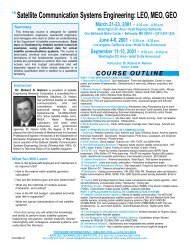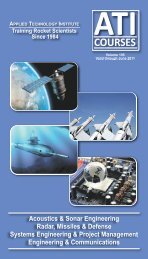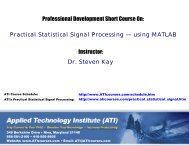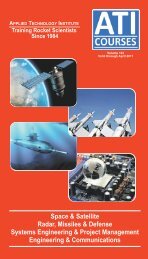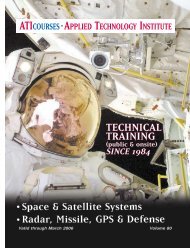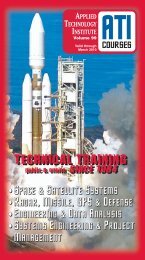Acoustics & Sonar Engineering Radar, Missiles & Defense Systems ...
Acoustics & Sonar Engineering Radar, Missiles & Defense Systems ...
Acoustics & Sonar Engineering Radar, Missiles & Defense Systems ...
You also want an ePaper? Increase the reach of your titles
YUMPU automatically turns print PDFs into web optimized ePapers that Google loves.
Cyber Warfare – Theory & Fundamentals<br />
NEW!<br />
Summary<br />
This two-day course is intended for<br />
technical and programmatic staff involved in<br />
the development, analysis, or testing of<br />
Information Assurance, Network Warfare,<br />
Network-Centric, and NetOPs systems. The<br />
course will provide perspective on emerging<br />
policy, doctrine, strategy, and operational<br />
constraints affecting the development of<br />
cyber warfare systems. This knowledge will<br />
greatly enhance participants’ ability to<br />
develop operational systems and concepts<br />
that will produce integrated, controlled, and<br />
effective cyber effects at each warfare level.<br />
Instructor<br />
Albert Kinney is a retired Naval Officer<br />
and holds a Masters Degree in electrical<br />
engineering. His professional experience<br />
includes more than 20 years of experience in<br />
research and operational cyberspace<br />
mission areas including the initial<br />
development and first operational<br />
employment of the Naval Cyber Attack<br />
Team.<br />
What You Will Learn<br />
• What are the relationships between cyber warfare,<br />
information assurance, information operations,<br />
and network-centric warfare?<br />
• How can a cyber warfare capability enable freedom<br />
of action in cyberspace?<br />
• What are legal constraints on cyber warfare?<br />
• How can cyber capabilities meet standards for<br />
weaponization?<br />
• How should cyber capabilities be integrated with<br />
military exercises?<br />
• How can military and civilian cyberspace<br />
organizations prepare and maintain their workforce<br />
to play effective roles in cyberspace?<br />
• What is the Comprehensive National<br />
Cybersecurity Initiative (CNCI)?<br />
From this course you will obtain in-depth<br />
knowledge and awareness of the cyberspace<br />
domain, its functional characteristics, and its<br />
organizational inter-relationships enabling your<br />
organization to make meaningful contributions in<br />
the domain of cyber warfare through technical<br />
consultation, systems development, and<br />
operational test & evaluation.<br />
December 14-15, 2011<br />
Columbia, Maryland<br />
$1090 (8:30am - 4:00pm)<br />
"Register 3 or More & Receive $100 00 each<br />
Off The Course Tuition."<br />
Course Outline<br />
1. Cyberspace as a Warfare Domain. Domain<br />
terms of reference. Comparison of operational<br />
missions conducted through cyberspace.<br />
Operational history of cyber warfare.<br />
2. Stack Positioning as a Maneuver Analog.<br />
Exploring the space where tangible cyber warfare<br />
maneuver really happens. Extend the network stack<br />
concept to other elements of cyberspace.<br />
Understand the advantage gained through<br />
proficient cyberscape navigation.<br />
3. Organizational Constructs in Cyber<br />
Warfare. Inter-relationships between traditional and<br />
emerging warfare, intelligence, and systems policy<br />
authorities.<br />
4. Cyberspace Doctrine and Strategy. National<br />
Military Strategy for Cyberspace Operations.<br />
Comprehensive National Cybersecurity Initiative<br />
(CNCI). Developing a framework for a full spectrum<br />
cyberspace capabilities.<br />
5. Legal Considerations for Cyber Warfare.<br />
Overview of pertinent US Code for cyberspace.<br />
Adapting the international Law of Armed Conflict to<br />
cyber warfare. Decision frameworks and metaphors<br />
for making legal choices in uncharted territory.<br />
6. Operational Theory of Cyber Warfare.<br />
Planning and achieving cyber effects.<br />
Understanding policy implications and operational<br />
risks in cyber warfare. Developing a cyber<br />
deterrence strategy.<br />
7. Cyber Warfare Training and Exercise<br />
Requirements. Understanding of the depth of<br />
technical proficiency and operational savvy required<br />
to develop, maintain, and exercise integrated cyber<br />
warfare capabilities.<br />
8. Cyber Weaponization. Cyber weapons<br />
taxonomy. Weapon-target interplay. Test and<br />
Evaluation Standards. Observable effects.<br />
9. Command & Control for Cyber Warfare.<br />
Joint Command & Control principles. Joint<br />
Battlespace Awareness. Situational Awareness.<br />
Decision Support.<br />
10. Survey of International Cyber Warfare<br />
Capabilities. Open source exploration of cyber<br />
warfare trends in India, Pakistan, Russia, and<br />
China.<br />
Register online at www.ATIcourses.com or call ATI at 888.501.2100 or 410.956.8805 Vol. 109 – 37



